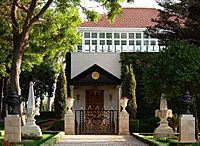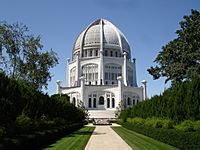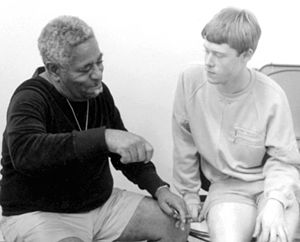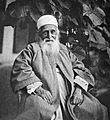Bahá'í Faith facts for kids
| Creators | |
| Important Books | |
| Aqdas · Kitáb-i-Íqán The Hidden Words |
|
| Leaders and Councils | |
|
Administrative Order |
|
| History | |
|
Bahá'í history · Timeline |
|
| Famous Members | |
|
Shoghi Effendi |
|
| Extra | |
|
Symbols · Laws |
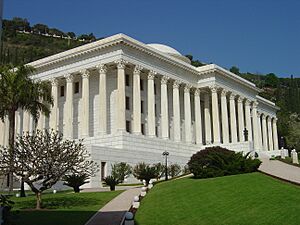
The Bahá'í Faith is a religion that started in the 1800s. It was founded by an Iranian person named Bahá'u'lláh in Tehran, Iran. People who follow this religion are called Bahá'ís.
The name Bahá'u'lláh comes from Arabic and means "The Glory of God." "Glory" means importance, power, and beauty. Bahá'ís believe Bahá'u'lláh represents God. He shows people God's importance, beauty, and light.
Bahá'ís believe in one God. This is called monotheism. They believe Bahá'u'lláh brought a message from God. Bahá'u'lláh taught that he was not the only one to bring God's message. He also said he would not be the last.
He taught that leaders of other major religions also brought messages from God. These include Jesus, Moses, Abraham, Muhammad, Krishna, and the Buddha. Bahá'ís call these special people "Manifestations of God." They believe these messages become deeper over time. Earlier messages were simpler than later ones.
Bahá'u'lláh said that humans cannot fully know God. This is because God is greater than the whole universe. But he said God wants people to know as much as they can. Bahá'u'lláh wrote that God sends special people to show himself to humans. Without these Manifestations of God, we could not know God.
Bahá'ís believe the God they pray to is the same God that Abraham, Jesus, and Krishna spoke about. Bahá'u'lláh was born into a Muslim family. Because of this, Bahá'ís are sometimes thought to be Muslims. Bahá'u'lláh is seen as the prophet for today's time. Bahá'ís believe he is not the last prophet from God. They think another prophet will not come for 1,000 years after Bahá'u'lláh's death.
Contents
History of the Bahá'í Faith
How the Religion Started
The Bahá'í Faith began in 1844. A man called the Báb announced he had a message from God. He said his job was to prepare people for a very important message. This message would come from God soon.
This started a new religion, and its followers were called Bábís. Many people in Iran, which was then called Persia, became Bábís. This made the government and Muslim religious leaders angry. They arrested and killed the Báb and his followers. But people still continued to follow the religion.
Before Bahá'u'lláh said he had a message from God, he was a Bábí. He became very well-known among the Bábís. When the Báb was killed, some Bábís became very angry. They tried to harm the king of Persia. Bahá'u'lláh had told them not to do this.
When the Bábís were caught, the government put many of them in jail. Bahá'u'lláh was also jailed in Tehran. While in jail, Bahá'u'lláh said he saw an angel. He called her the "maid of heaven." The angel told him he had to share a message from God with the world. The angel said God would protect him to teach this message.
Later, he was let out of jail. The Persian government made him move to Baghdad. At that time, Baghdad was ruled by the Ottoman Empire.
While Bahá'u'lláh was in Baghdad, he faced many challenges. But he also made many friends. The Persian government was not happy that he was doing well in Baghdad. So, they asked the Ottoman Empire to move him even farther away from Persia.
Before he left Baghdad in 1863, he held a special festival. It lasted for 12 days on a small island in the Tigris river. He called this place Ridvan, which means paradise. There, he told his closest friends and family his important news. He said he was the promised one that all major religions had spoken about. He also said that one day, the whole world would know his message.
The Ottoman Empire sent him to many different cities. These included Constantinople, Adrianople, Alexandria, and finally Akka. He was kept in different jails during this time. The city of Akka itself was like a big jail, surrounded by a large wall.
While in Baghdad and after, he wrote many books and letters. These answered questions from his friends and followers. At one point, he was poisoned. This made his hands shake badly, so he could not write anymore. After that, someone else wrote down what he said. When he was older, his oldest son, `Abdu'l-Bahá, helped him move. He moved to a house near Mount Carmel. He lived there until he died in 1892.
Leaders After Bahá'u'lláh
After Bahá'u'lláh died, people followed `Abdu'l-Bahá. Bahá'u'lláh had written that `Abdu'l-Bahá had special guidance. He said that if `Abdu'l-Bahá explained anything Bahá'u'lláh said, Bahá'ís should believe it.
`Abdu'l-Bahá also wrote many letters and gave talks. He visited cities like Paris, London, Montreal, New York City, and San Francisco. This helped the Bahá'í Faith spread in Europe and North America. He died in 1921. In his will, he asked Bahá'ís to follow his grandson, Shoghi Effendi.
Shoghi Effendi was born in 1900. He was a young man when his grandfather died and he became the Bahá'í leader. He helped create the different groups and councils that run the Bahá'í Faith today. He also organized the religion in many ways. He wrote many books and letters to explain the teachings of his grandfather and great-grandfather. He lived until 1957 and died in England.
After Shoghi Effendi died, Bahá'ís did not have a single leader for six years. This was because Shoghi Effendi had not left a will. His helpers did not think they were allowed to lead the Bahá'ís. So, they helped the Bahá'í community follow Shoghi Effendi's last plan. At the end of that plan, in 1963, they held an election. They formed the Universal House of Justice, which Bahá'u'lláh had written about. The Universal House of Justice has led the Bahá'ís ever since.
Holy Books of the Bahá'í Faith
Bahá'u'lláh wrote many books and letters. `Abdu'l-Bahá, whose name means "Servant of Glory," also wrote many special books and letters. Bahá'u'lláh's great-grandson, Shoghi Effendi, wrote many books and letters too. Bahá'ís use these to better understand the writings of Bahá'u'lláh and `Abdu'l-Bahá. The most important of these books is the Aqdas.
Bahá'ís also believe that the Bible, the Qur'an, the Gita, and other books from other religions are special.
Bahá'í Beliefs
Here are some important Bahá'í beliefs:
- Bahá'u'lláh came to unite all humans as one family.
- There is only one God, but God has many names.
- All great religions come from the same source, which is God.
- God treats all humans as equal.
- God treats men and women as equal.
- Prejudices, which are unkind beliefs about people, should be overcome.
- Nations should learn to get along and work together.
- Science and religion do not have to disagree. They look at the same world from different angles.
- People should try to find the truth for themselves.
- Everyone should get an education, whether at school or by learning in other ways.
- The world should have one extra language that everyone understands.
Bahá'í Community
People and Meetings
There are about eight or nine million Bahá'ís around the world. They come from all different peoples and speak many languages. The Bahá'í Faith looks a bit different in various countries. This is because there are few special rituals. So, Bahá'ís can include their own culture in how they celebrate Bahá'í events and say prayers.
Bahá'ís meet every nineteen days in a gathering called a "Feast." There is usually food, but it is not required. These meetings start with prayers. Someone usually reads aloud from the holy writings. Sometimes there is music and singing, or plays. Sometimes it is just quiet time or meditation.
After this time, which Bahá'ís call the "devotional" part of the Feast, they have a community discussion. All sorts of topics important to the members can be talked about. Bahá'ís say this is a "consultative" time. Here, Bahá'ís can consult with each other.
After this, there is a social time. People can share food and drinks (no alcohol). Sometimes there is also music, plays, or other entertainment. This time is for Bahá'ís in that city to get to know each other better and become good friends.
Temples and Bahá'í Centers
Bahá'ís often do not have one main place where they meet, except in large cities. In smaller places, they usually meet in each other's homes. Some larger cities have "Bahá'í Centers." These can be used for community meetings, classes, or meetings of groups and councils.
In a very few cities around the world, there are Bahá'í temples. These temples are found on each continent.
How the Community is Organized
Bahá'ís are organized in a worldwide community. They do not have priests. Everyone is responsible for their own prayers. Bahá'ís are also responsible for reading their holy books themselves. They learn about their religion on their own.
Bahá'ís elect leaders for their community. These leaders help organize activities. They also help solve problems between members. They make decisions that are not clearly stated in the holy writings. These elected groups are called Spiritual Assemblies. One day, they will be called Houses of Justice.
There is one main House of Justice. Bahá'ís call it the Universal House of Justice. It leads the entire worldwide Bahá'í community. Bahá'ís elect this Universal House of Justice every five years. They elect National and Local Spiritual Assemblies once each year.
Dizzy Gillespie
John Birks "Dizzy" Gillespie was born on October 21, 1917, in Cheraw, South Carolina. He died on January 6, 1993. Dizzy became a Bahá'í around 1970. He was one of the most famous followers of the religion. It helped him understand his place among great trumpeters. It also helped him change from a tough person to someone who cared about the world. He moved from unhealthy habits to focusing on positive energy.
Author Nat Hentoff, who knew Gillespie for forty years, said this. Gillespie's change was greatly helped by Bill Sears's book Thief in the Night. Gillespie often talked about the Bahá'í Faith during his trips abroad.
Images for kids
-
Seat of the Universal House of Justice, governing body of the Baháʼís, in Haifa, Israel
-
Baháʼí House of Worship in Ingleside, Sydney, Australia
-
Symbols of many religions on a pillar of the Baháʼí House of Worship in Wilmette, Illinois, U.S.
-
The Baháʼí House of Worship, Wilmette, Illinois, is the oldest surviving Baháʼí House of Worship in the world.
-
The Lotus Temple, a Baháʼí House of Worship in New Delhi, India. It attracts an average of 4 million visitors a year.
-
Baháʼí gardens in Haifa, Israel
-
Students of School for Girls, Tehran, 13 August 1933. This photograph may be of the students of Tarbiyat School for Girls which was established by the Baháʼí Community of Tehran in 1911; the school was closed by government decree in 1934.
See also
 In Spanish: Bahaísmo para niños
In Spanish: Bahaísmo para niños
 | Victor J. Glover |
 | Yvonne Cagle |
 | Jeanette Epps |
 | Bernard A. Harris Jr. |



